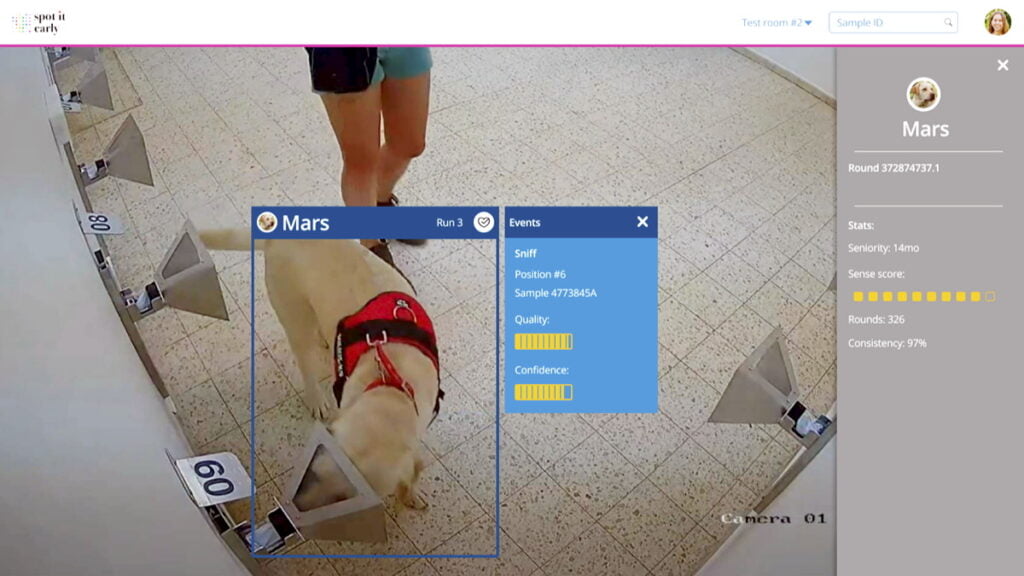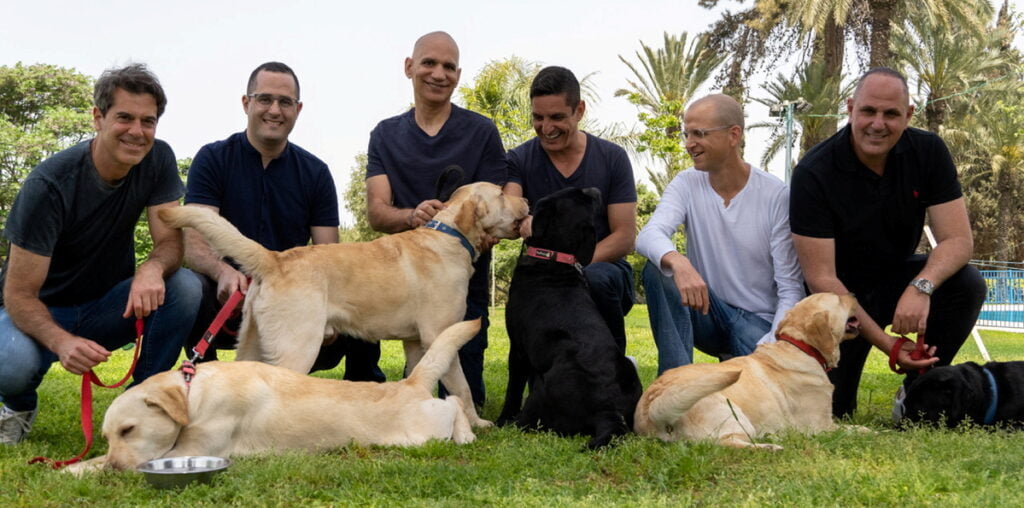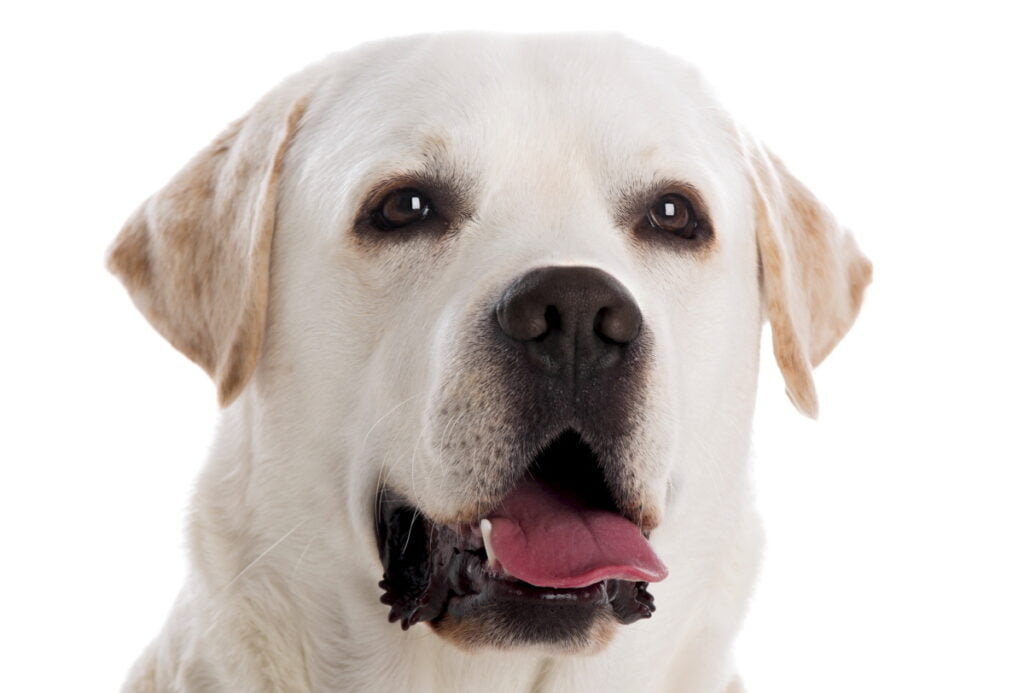Patients provide a single breath sample by post for early diagnosis
An Israeli startup is harnessing dogs’ unmatched biological sense of smell to detect early-stage cancers.
It’s training a dozen labradors to sniff out the first indications of breast, lung, colon, and prostate cancers from a single breath sample.

Ariel Ben Dayan, CEO and co-founder of SpotitEarly, tells NoCamels his company will use man’s best friend to save people’s lives.
The company has developed a simple and inexpensive test for the early detection of several cancers, based on a combination of artificial intelligence and dog sensing. The company’s breath test – which screens patients for breast, lung, colon, and prostate cancers in one test – paves a new way for cancer detection.
“We’re developing a new kind of screening test,” says Co-founder Udi Bobrovsky. “We took what science already discovered – but what remained in the science world and academia – and we are bringing it to real life and building a lab that uses this amazing capability of dogs to identify cancer. And on top of that, we are building a robust technology.”
SpotitEarly aims to scale up and commercialize existing technology that has already been used, for example, to screen passengers at airports for COVID-19. He says they should eventually be able to screen hundreds of thousands of samples a year.
Dogs can identify cancer molecules in human breath samples. Their early detection could have major implications for patients globally.
Bobrovsky says: “If you discover cancer in its early stages, meaning in stages one or two or even before, you can save nine out of 10 people. If you discover cancer in, let’s say, the fourth stage, you can only save one out of 10 people. If we can help discover cancer in the early stage, we can do a great thing for humanity.”
SpotitEarly sends a mask to the home of those being tested. They breathe into it and that sample is enough for the dog to do its detection work. The company currently has 12 labradors, six working and six in training. They learn through a reward-based system to scan samples, which are inserted into sniffing ports.
“For the dogs to participate in the testing lab is like a game. Imagine a dog enters the room and has a challenge to solve by himself. He is happy to come into the room to do his job and get rewards,” says Bobrovsky.

Patients who receive a positive result will then go for a mammogram, colonoscopy or other scan to give doctors a more detailed picture.
SpotitEarly was founded in 2020 by four Israelis – Roi Ophir, Ohad Sharon, Udi Bobrovsky, and Ariel Ben Dayan – with experience in technology, digital health, entrepreneurship, and product development.
Ben Dayan served as commander of Israel’s prominent Oketz canine unit. “It is the biggest dog unit in the world, with more than 350 dogs and soldiers,” he says.
Sign up for our free weekly newsletter
Subscribe“I truly believe in dogs’ capability and I know that they are the best biological sensor that you can actually face. Even in the world of explosives, no one has succeeded in developing a technological nose that is better than dogs’ capability.”
It is widely known within the scientific research community that molecules within the blood system circulate into the lungs and are exhaled by human breath. These molecules contain scented factors – called volatile organic compounds (VOCs) – which carry biomarkers for several genetic conditions, including cancer. Each cancer has a unique odor that can be detected and aid cancer diagnosis.
The sensing capabilities of dogs have been widely studied and scientists have determined that dogs can detect these cancerous odors – and the presence of VOCs – with high sensitivity above 95 per cent.
The screening platform offers a non-intrusive, accurate screening for multiple types of cancer at the same time. “Coordinating a mammogram or a colonoscopy requires a lot of time and attention both from the patient and the care system,” Bobrovsky says.
“And, at the end of the day, it only covers one type of cancer. What we can do in a very easy-to-use screening test today is being done in one invasive test for a specific type of cancer.
“Our mission is to increase the adoption of screening tests by creating the easiest and most frictionless test that we can offer to people. We want them to take screening measures frequently.”
Catching cancer early
By catching cancer early, the company hopes to save not only lives but lessen costs and treatment intensity for patients diagnosed with cancer. “We are paving the way to a new field of diagnostic tools,” Bobrovsky explains.
The entire canine detection process – including the dogs’ behavior – is analyzed by the company’s proprietary technology system to maximize prediction accuracy. The quick scanning process allows for efficient patient results to minimize anxiety and encourage early action against cancer.
The company is carrying out a major clinical trial led by the Sourasky (Ichilov) Medical Center in Tel Aviv and the Hadassah Medical Center in Jerusalem. They’re testing the efficacy of the technology and will likely be finished by the first half of 2023. Following the study’s conclusion, SpotitEarly hopes to continue to scale the company’s operations in Israel and the United States to help even more patients.
The company says it is building off of the spirit of Israeli innovation, creativity and adventure to propel its unique solution to cancer detection.
“We love to take from our own experience, take challenges, and tackle them with extreme capabilities. At the end of the day, if we succeed in developing this magnificent product, we will actually be able to increase adoption [of screening tests] and save many peoples’ lives,” says Ben Dayan.
Related posts

Editors’ & Readers’ Choice: 10 Favorite NoCamels Articles

Forward Facing: What Does The Future Hold For Israeli High-Tech?

Impact Innovation: Israeli Startups That Could Shape Our Future




Facebook comments